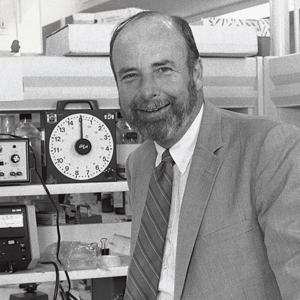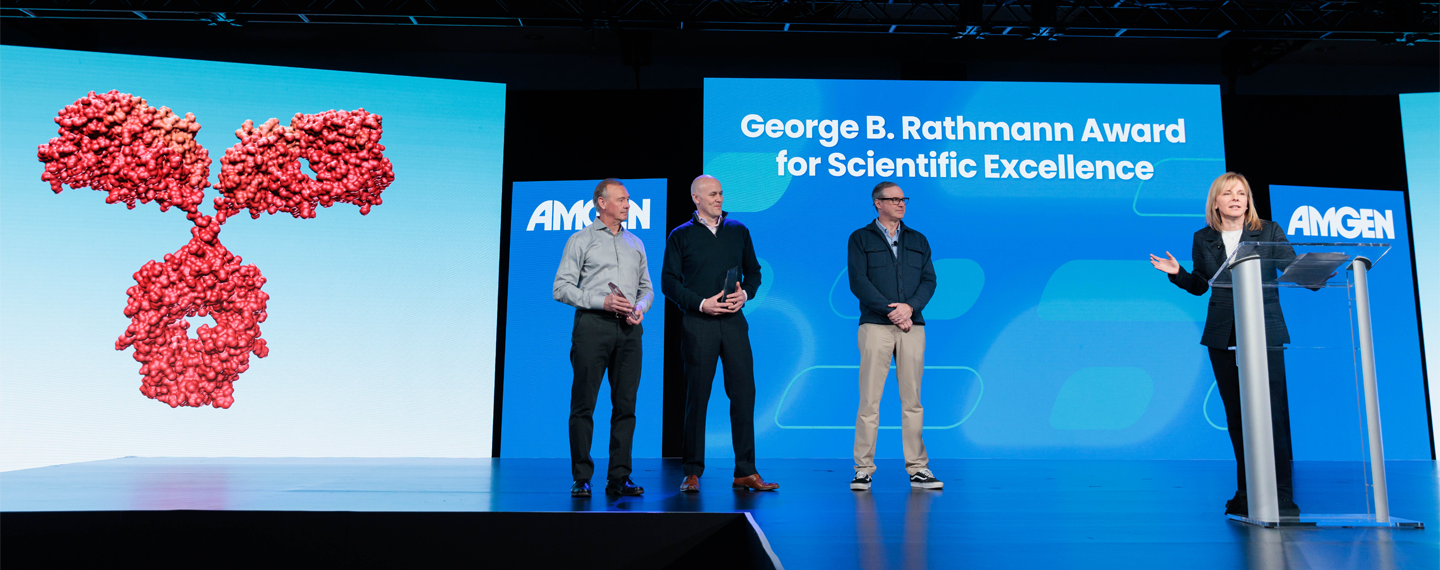The winners of Amgen's prestigious George B. Rathmann Award for Scientific Excellence are Simon Jackson and Chadwick (Chad) King. This award, which has only been given four other times in the company's history, is named after the legendary first CEO of Amgen. This year it recognizes the Research duo's groundbreaking work on the development of Repatha® (evolocumab), a treatment for adult patients battling high LDL (low-density lipoprotein), or "bad" cholesterol levels, and for adults with established cardiovascular disease at risk of cardiovascular events. Jackson and King's achievement is not only a personal triumph but also exemplifies their dedication to improving human health with a medicine that to date has been prescribed to 4.5 million patients worldwide.
Repatha® is indicated:
To reduce the risk of major adverse cardiovascular (CV) events (CV death, myocardial infarction, stroke, unstable angina requiring hospitalization, or coronary revascularization) in adults with established cardiovascular disease.
IMPORTANT SAFETY INFORMATION
Contraindication: Repatha® is contraindicated in patients with a history of a serious hypersensitivity reaction to evolocumab or any of the excipients in Repatha®. Serious hypersensitivity reactions including angioedema have occurred in patients treated with Repatha®.
Please see additional Important Safety Information at the end of this article.
A path rooted in genetics
For Jackson, executive director in Research, and King, associate vice president in Research, their path to this award began with a scientific challenge rooted in human genetics.
In the early 2000s, researchers had discovered that mutations in a gene called PCSK9 (proprotein convertase subtilisin/kexin type 9) significantly impacted LDL cholesterol levels and, by extension, the risk of atherosclerosis—a condition where arteries become clogged with fatty deposits, resulting in heart attacks, strokes and other serious cardiovascular events. These early findings set the stage for the biopharmaceutical industry to understand and target PCSK9 as a means of combating high cholesterol and cardiovascular risk. But the road was anything but straightforward.
Most scientists in the field believed that PCSK9 controlled cholesterol by cutting up other proteins involved in regulating cholesterol levels. This belief led most drug developers in the industry to look for molecules that blocked this protein-cleaving function of PCSK9.
Jackson, however, took a different approach to understanding PCSK9's function. Through meticulous experiments, Jackson revealed that PCSK9's critical function was not in cleaving other proteins but in binding to LDL receptors on liver cells and marking them for destruction in cellular recycling centers called lysosomes. Without sufficient LDL receptors, the liver struggled to remove LDL from the bloodstream. This revelation was the key that unlocked new possibilities for treatment.
King joined the effort with his expertise in discovering antibody drugs and high-throughput screening, a method to rapidly test thousands of potential drug candidates. Working together, Jackson and King formed a powerful partnership. King's team developed assays—laboratory tests—to measure the interaction between PCSK9 and LDL receptors. Jackson and King's teams identified the "sweet spot" on PCSK9 where antibodies could potently block its harmful effects. Within six months, they scaled up their assays to screen thousands of antibodies and found candidates that potently blocked PCSK9's interaction with LDL receptors.
After identifying promising antibodies, the teams optimized these molecules, tested them in animal models, and ultimately developed evolocumab. This therapy lowered LDL cholesterol levels by blocking and preventing PCSK9 from destroying LDL receptors, thus enhancing the body's ability to clear cholesterol from the blood.
Continuing Rathmann's legacy
George Rathmann, a pioneer in the world of biotechnology, led Amgen as CEO from its inception in 1980. With a PhD in physical chemistry, Rathmann's career was marked by a relentless drive to bridge science and practical healthcare solutions. Under his leadership, Amgen evolved from a startup to a global biotechnology powerhouse. The George B. Rathmann Award, established in 2005, honors this legacy by celebrating Amgen employees whose work exemplifies innovation and dedication to improving human health.
Jackson and King's work embodies the qualities celebrated by the Rathmann Award: bold scientific inquiry, relentless problem-solving and a deep commitment to patient care. By addressing a complex biological puzzle with creativity and collaboration, they have not only transformed lives but also added an important chapter to the legacy of George Rathmann and Amgen's mission to serve patients.

George Rathmann in one of the Building 2 laboratory bays at Amgen headquarters in 1982.
"Receiving this award is deeply humbling," said Jackson. "It is a reminder of what we can achieve when science and innovation come together to serve patients. Knowing that our work has made a tangible difference in people's lives is the greatest reward of all."
King echoed this sentiment. "This recognition isn't just for us, but for the incredible teams that supported us every step of the way," he said. "The Rathmann Award inspires us to keep pushing the boundaries of what's possible in biotechnology. Together, we can continue to create medicines that change lives."
IMPORTANT SAFETY INFORMATION
- Contraindication: Repatha® is contraindicated in patients with a history of a serious hypersensitivity reaction to evolocumab or any of the excipients in Repatha®. Serious hypersensitivity reactions including angioedema have occurred in patients treated with Repatha®.
- Hypersensitivity Reactions: Hypersensitivity reactions, including angioedema, have been reported in patients treated with Repatha®. If signs or symptoms of serious hypersensitivity reactions occur, discontinue treatment with Repatha®, treat according to the standard of care, and monitor until signs and symptoms resolve.
- Adverse Reactions in Adults with Primary Hyperlipidemia: The most common adverse reactions (>5% of patients treated with Repatha® and more frequently than placebo) were: nasopharyngitis, upper respiratory tract infection, influenza, back pain, and injection site reactions.
From a pool of the 52-week trial and seven 12-week trials: Local injection site reactions occurred in 3.2% and 3.0% of Repatha®-treated and placebo-treated patients, respectively. The most common injection site reactions were erythema, pain, and bruising. Hypersensitivity reactions occurred in 5.1% and 4.7% of Repatha®-treated and placebo-treated patients, respectively. The most common hypersensitivity reactions were rash (1.0% versus 0.5% for Repatha® and placebo, respectively), eczema (0.4% versus 0.2%), erythema (0.4% versus 0.2%), and urticaria (0.4% versus 0.1%).
- Adverse Reactions in the Cardiovascular Outcomes Trial: The most common adverse reactions (>5%of patients treated with Repatha® and more frequently than placebo) were: diabetes mellitus (8.8% Repatha®, 8.2% placebo), nasopharyngitis (7.8% Repatha®, 7.4% placebo), and upper respiratory tract infection (5.1% Repatha®, 4.8% placebo).
Among the 16,676 patients without diabetes mellitus at baseline, the incidence of new-onset diabetes mellitus during the trial was 8.1% in patients treated with Repatha® compared with 7.7% in patients that received placebo.
- Immunogenicity: Repatha® is a human monoclonal antibody. As with all therapeutic proteins, there is potential for immunogenicity with Repatha®.
Indications
Repatha® is indicated:
- To reduce the risk of major adverse cardiovascular (CV) events (CV death, myocardial infarction, stroke, unstable angina requiring hospitalization, or coronary revascularization) in adults with established cardiovascular disease.
- As an adjunct to diet, alone or in combination with other low-density lipoprotein cholesterol (LDLC)- lowering therapies, in adults with primary hyperlipidemia, including heterozygous familial hypercholesterolemia (HeFH) to reduce LDL-C.
Please see full Prescribing Information.





